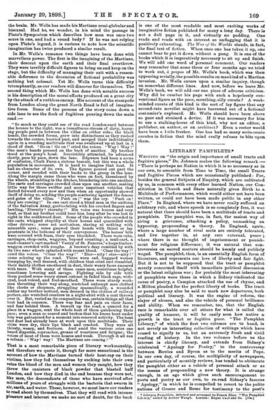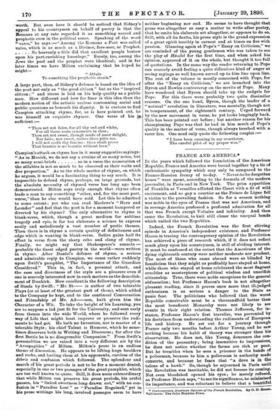LITERARY PAMPHLETS.*
WRITING on "the origin and importance of small tracts and' fugitive pieces," Dr. Johnson makes the following remark :— "There is perhaps no Nation in which it is so necessary as in our own, to assemble from Time to Time, the small Tracts. and fugitive Pieces which are occasionally published : For, besides the general Subjects of Enquiry, which are cultivated by us, in common with every other learned Nation, our Con- stitution in Church and State naturally gives Birth to a. Multitude of Performances, which would either not have been written, or could not have been made public in any other Place." In England, where we have never really suffered an arbitrary rule, and where speech is so completely free, it wan natural that there should have been a multitude of tracts and pamphlets. The pamphlet was, in fact, the easiest way of airing a grievance, attacking a policy, unmasking an hypocrisy, propounding a theory. In England, again, where a large number of rival sects are entirely tolerated, and live together in, at any rate external, peace ; where there is no thought of imprisonment or punish- ment for religions difference; it was natural that con- troversies on sacred matters should be keenly and publicly waged. The pamphlet, then, is an essentially English form of literature, and represents our love of liberty and fair fight. But it is not to be supposed that the tract or pamphlet merely concerned itself with immediate political discussion. or the latest religious war ; for probably the most interesting' of pamphlets were those in which a Sidney vindicated the cause of poetry, a Campion attacked the use of rhyme, and a Milton pleaded for the perfect liberty of books. The tract, or pamphlet may also be said to mark new departures, both political and literary. It was the engine of reform, the slayer of abuses, and also the vehicle of personal brilliance and ability. When we remember, too, that the English race is remarkable over all others for what is called the quality of humour, it will be easily seen how native ai growth is the tract or fugitive piece. "The Pamphlet Library," of which the first two volumes are to hand, is not merely an interesting collection of writings which have ceased to signify to us, but an extremely fresh and vivid reading of history. In the two volumes before us the interest is chiefly literary, and extends from Sidney's celebrated " Apology for Poetry," to the controversy between Bowles and Byron as to the merits of Pope. In our own day, of course, the multiplicity of newspapers, and particularly of monthly reviews, has tended to obliterate the pamphlet either as a vehicle of personal attack or an the means of propounding a new theory. It is strange enough, in an age which gives such encouragement to poets and poetry as our own, to re-read Sidney's famous "Apology," in which he is compelled to revert to the polite nations of Greece and Rome for testimony to the poet's
• Literary Pamphlets. &looted and arranged hy Ernest Rim. "The Pamphlet Lib.ary," edited by /Litt= Waugh. London : Kegaz raul and Co. [10..]
worth. But even here it should be noticed that Sidney's appeal to his countrymen on behalf of poetry is that the
Romans at any rate regarded it as something sacred and prophetic even in the political sense. Speaking of the word 4' vates," he says :—" Among the Romans a Poet was called vates, which is as much as a Diviner, fore. seer, or Prophet. „ . . . . So heavenly a title did that excellent people bestow upon his part-ravishing knowlege." Surely, too, among the Jews the poet and the prophet were identical; and in far later times we have Milton exclaiming that he hoped he might-
" Attain
To something like prophetic strain."
A large part, then, of Sidney's defence is based on the idea of the poet not only as "the good citizen" but as the "inspired eitizen ; " and stress is laid on his holy quality as a public man. How different and how far finer is this idea than the modern notion of the artistic recluse contemning social and public questions as beneath his dignity. It is curious to find Campion attacking rhyme, for, as is here pointed out, he was himself an exquisite rhymer. One verse of his jA, sufficient :—
" Thou art not faire, for all thy red and white,
For all those rosie ornaments in thee ; Thou art not sweet, though made of meer delight, Nor faire, nor sweet, unless thou pitie me. I will not suoth thy fancies : thou shalt prove That beautie is no heautie without love."
Campion's attack on rhyme has in it many suggestive sayings : "As in Musick, we do not say a straine of so many notes, but so many semi-briefs so in a verse the numeration of the sillables is not so much to be observed as their waits and due proportion." As to the whole matter of rhyme, on which he argues, it would be a fascinating thing to say much. It is impossible to defend rhyme, perhaps, on large grounds, but the absolute necessity of rhymed verse has long ago been demonstrated. Milton says truly enough that rhyme often leads a man to say something "other, and, for the most part, worse," than he else would have said. Let this be admitted to some extent ; yet who can read Marlowe's "Hero and Leander" and feel that the poet is for a moment hampered or diverted by his rhyme? The only alternative to rhyme is blank-verse, which, though a great medium for sublime tragedy and epic, is far too elaborate a science to express easily and melodiously a vast number of poetic themes.
Then there is in rhyme a certain quality of definiteness and edge which is wanting in blank-verse. Satire gains half its effect in verse from the sharp echo and clang of rhyme. Finally, we might say that Shakespeare's sonnets — probably the finest edged poetry in the world—were written in rhyme. After Daniel's defence of rhyme, a serious and admirable reply to Campion, we come rather suddenly upon Swift's pamphlet, "The Importance of the Guardian Considered." This is, in fact, a personal attack, and the ease and directness of the style are a pleasure even if one is scarcely interested now in such matters as the demolish- ment of Dunkirk. How excellent is the following description of Steele by Swift : "Mr. St— is author of two tolerable Plays (or at least of the greatest part of them), which added to the Company he kept, and to the continual Conversation and Friendship of Mr. Ad—son, bath given him the Character of a Wit. To take the height of his Learning, you are to suppose a lad just fit for the University, and sent early from thence into the wide World, where he followed every way of Life that might least improve or preserve the rudi- ments he had got. He bath no Invention, nor is master of a tolerable Style ; his chief Talent is Humour, which he some- times discovers both in Writing and Discourse ; for after the first Bottle he is no disagreeable Companion." From Swift's personalities we are raised into a very different air by the "Areopagitica" of Milton. Milton's prose is an endless theme of discussion. He appears to be lifting huge boulders and rocks, and hurling them at his opponents, careless of the debris and confusion which followed. The splendour and march of his great periods is not to be for a moment denied, especially in one or two passages of the great pamphlet, which are too well known to quote. Still, it does seem extraordinary that while Milton can preserve his great periods, his artful
pauses, his "linked sweetness long drawn out," with no con-
fusion - fusion "Paradise Lost" or "Paradise Regained," yet in his prose writings his long, involved passages seem to have
neither beginning nor end. He seems to have thought that prose was altogether so easy a matter to write after poetry, that he omits his elaborate art altogether, or appears to do so. Still, with all its faults, his prose style is the grand expression of a great spirit terribly in earnest and at times on fire with passion. Glancing again at Pope's "Essay on Criticism," we are reminded of the young gentleman who was taken to see the play of Ham/et for the first time, and when asked his opinion, approved of it on the whole, but thought it too full of quotations. In the same way the reader returning to Pope can scarcely avoid feeling a quite ridiculous kind of anger at seeing sayings so well known served up to him line upon line. The rest of the volume is mostly concerned with Pope, for after the "Essay on Criticism," we are launched into the Byron and Bowles controversy on the merits of Pope. Many have wondered that Byron should take up the cudgels for Pope. For this there were probably two quite dissimilar reasons. On the one hand, Byron, though the leader of a "natural" revolution in literature, was mentally, though not in temperament, of the eighteenth century. Urged forward by the new movement in verse, he yet looks longingly back. This has been pointed out before ; but another reason for his championing Pope was that he had in him much of Pope's quality in the matter of verse, though always touched with a rarer fire. One need only quote the following couplet :— "I have been cunning in my overthrow, The careful pilot of my proper woe."



















































 Previous page
Previous page